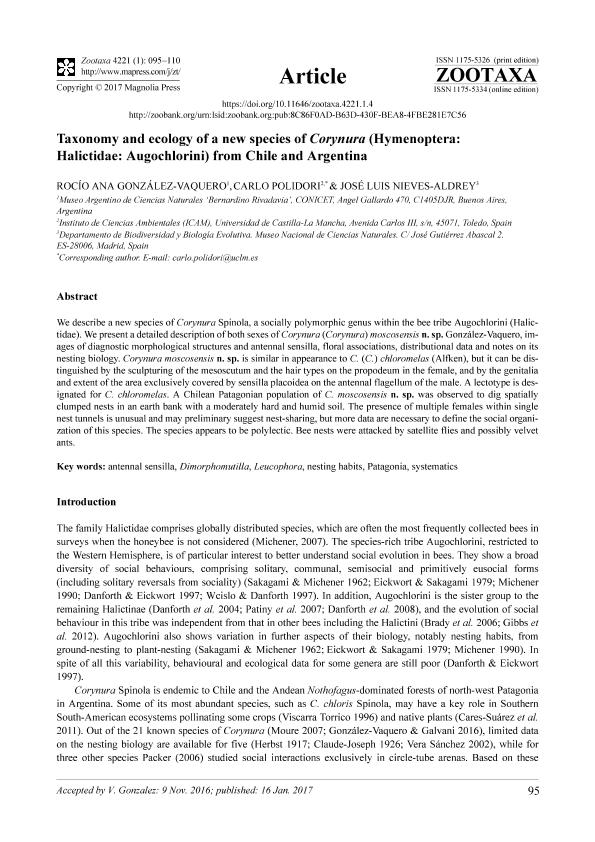Artículo
Taxonomy and ecology of a new species of Corynura (Hymenoptera: Halictidae: Augochlorini) from Chile and Argentina
Fecha de publicación:
01/2017
Editorial:
Magnolia Press
Revista:
Zootaxa
ISSN:
1175-5326
e-ISSN:
1175-5334
Idioma:
Inglés
Tipo de recurso:
Artículo publicado
Clasificación temática:
Resumen
We describe a new species of Corynura Spinola, a socially polymorphic genus within the bee tribe Augochlorini (Halictidae). We present a detailed description of both sexes of Corynura (Corynura) moscosensis n. sp. González-Vaquero, images of diagnostic morphological structures and antennal sensilla, floral associations, distributional data and notes on its nesting biology. Corynura moscosensis n. sp. is similar in appearance to C. (C.) chloromelas (Alfken), but it can be distinguished by the sculpturing of the mesoscutum and the hair types on the propodeum in the female, and by the genitalia and extent of the area exclusively covered by sensilla placoidea on the antennal flagellum of the male. A lectotype is designated for C. chloromelas. A Chilean Patagonian population of C. moscosensis n. sp. was observed to dig spatially clumped nests in an earth bank with a moderately hard and humid soil. The presence of multiple females within single nest tunnels is unusual and may preliminary suggest nest-sharing, but more data are necessary to define the social organization of this species. The species appears to be polylectic. Bee nests were attacked by satellite flies and possibly velvet ants.
Palabras clave:
Antennal Sensilla
,
Dimorphomutilla
,
Leucophora
,
Nesting Habits
Archivos asociados
Licencia
Identificadores
Colecciones
Articulos(MACNBR)
Articulos de MUSEO ARG.DE CS.NAT "BERNARDINO RIVADAVIA"
Articulos de MUSEO ARG.DE CS.NAT "BERNARDINO RIVADAVIA"
Citación
González Vaquero, Rocío Ana; Polidori, Carlo; Nieves-Aldrey, José Luis; Taxonomy and ecology of a new species of Corynura (Hymenoptera: Halictidae: Augochlorini) from Chile and Argentina; Magnolia Press; Zootaxa; 4221; 1; 1-2017; 95-110
Compartir
Altmétricas




